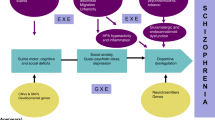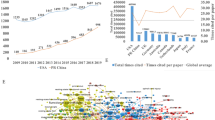Abstract
Purpose
The ABC Schizophrenia study, led by a single research team, investigated a schizophrenia sample systematically over quarter of a century. This paper summarises results from 1996 onwards. The initial goals were to explain the considerably higher age at first admission in women, and to obtain precise information on the onset and early course of schizophrenia as a prerequisite for early intervention.
Method
The study was hypothesis-driven. People with schizophrenia were compared in the prodrome and at first admission to those with unipolar depression and to healthy controls. We analysed the medium-term (5-year) and the long-term (12-year) course of schizophrenia, its symptom dimensions, social parameters and predictors. Samples: (1) 276 population-based first admissions (232 first episodes) of schizophrenia (age range 12–59 years); (2) a subsample of 130 first admissions for schizophrenia; (3) 130 first admissions for unipolar depression; (4) 130 healthy population controls and (5) 1,109 consecutive first admissions for schizophrenia spectrum disorder without an age limit.
Results
The prodromal stages of schizophrenia and depression were very similar until positive symptoms appeared. The most frequent symptom in schizophrenia was depressed mood. The course of psychosis from prodrome to 12 years following first admission was very variable. From 5 to 12 years after first admission the course was characterised by irregular exacerbations of the main symptom dimensions, with no overall deterioration or improvement.
Conclusions
Schizophrenic psychosis and severe affective disorder, rather than representing discrete illnesses, probably mark different stages in the manifestation of psychopathology produced by various degrees of brain dysfunction.








Similar content being viewed by others
References
Häfner H, Maurer K, Löffler W, an der Heiden W, Munk-Jφrgensen P, Hambrecht M, Riecher-Rössler A (1998) The ABC schizophrenia study: a preliminary overview of the results. Soc Psychiatry Psychiatr Epidem 33:380–386
Kraepelin E (1909–1915) Psychiatrie, 8. Aufl. (Bd 1-4). Barth, Leipzig
Kraepelin E (1896) Psychiatrie, 5. Aufl. Barth, Leipzig
Siris SG, Bench C (2003) Depression and schizophrenia. In: Hirsch SR, Weinberger DR (eds) Schizophrenia, 2nd edn. Blackwell Publishing, Oxford, pp 142–167
Buckley PF, Miller BJ, Lehrer DS, Castle DJ (2009) Psychiatric comorbidities and schizophrenia. Schizophr Bull 35:383–402
Cotton SM, Lambert M, Schimmelmann BG, Mackinnon A, Gleeson JF, Berk M, Hides L, Chanen A, McGorry PD, Conus P (2012) Depressive symptoms in first episode schizophrenia spectrum disorder. Schizophr Res 134:20–26
Häfner H, Maurer K, Trendler G, an der Heiden W, Schmidt M, Könnecke R (2005) Schizophrenia and depression: challenging the paradigm of two separate diseases—a controlled study of schizophrenia, depression and healthy controls. Schizophr Res 77:11–24
Häfner H, Löffler W, Maurer K, Hambrecht M, an der Heiden W (1999) Depression, negative symptoms, social stagnation and social decline in the early course of schizophrenia. Acta Psychiatr Scand 100:105–118
Maurer K, Trendler G, Schmidt M, an der Heiden W, Könnecke R, Häfner H (2006) Schizophrenie und depression. Nervenarzt 77:809–822
Häfner H (1996) The epidemiology of onset and early course of schizophrenia. In: Häfner H, Wolpert EM (eds) New research in psychiatry. Hogrefe & Huber, Seatle, pp 33–61
Loebel AD, Lieberman JA, Alvir JMJ, Mayerhoff DI, Geisler SH, Szymanski SR (1992) Duration of psychosis and outcome in first-episode schizophrenia. Am J Psychiatry 149:1183–1188
Birchwood M, McMillan JF (1993) Early intervention in schizophrenia. Aust N Z J Psychiatry 27:374–378
McGorry PD, Edwards J, Mihalopoulos C, Harrigan SM, Jackson JH (1996) EPPIC: an evolving system of early detection and optimal management. Schizophr Bull 22:305–326
Linszen D, Lenior M, de Haan L, Dingemans P, Gersons B (1998) Early intervention, untreated psychosis and the course of early schizophrenia. Br J Psychiatry 172(Suppl):84–89
Norman RM, Malla AK (2001) Duration of untreated psychosis: a critical examination of the concept and its importance. Psychol Med 31:381–400
Häfner H, Maurer K (2006) Early detection of schizophrenia: current evidence and future perspectives. World Psychiatry 5:130–138
Löffler W, Häfner H (1999) Dimensionen der schizophrenen Symptomatik. Nervenarzt 70:416–429
Häfner H, Maurer K, Löffler W, an der Heiden W, Könnecke R, Hambrecht M (1999) Onset and prodromal phase as determinants of the course. In: Gattaz WF, Häfner H (eds) Search for the causes of schizophrenia, vol IV: balance of the century. Steinkopff-Verlag/Springer, Darmstadt/Berlin, pp 1–24
van Os J, Howard R, Takei N, Murray R (1995) Increasing age is a risk factor for psychosis in the elderly. Soc Psychiatry Psychiatr Epidemiol 30:161–164
Castle DJ, Wessely S, van Os J, Murray RM (1998) Psychosis in the inner city. Psychology Press, East Sussex
Häfner H, Hambrecht M, Löffler W, Munk-Jørgensen P, Riecher-Rössler A (1998) Is schizophrenia a disorder of all ages? A comparison of first episodes and early course across the life-cycle. Psychol Med 28:351–365
Häfner H, Löffler W, Riecher-Rössler A, Häfner-Ranabauer W (2001) Schizophrenie und Wahn im höheren und hohen Lebensalter. Nervenarzt 72:347–357
Könnecke R, Häfner H, Maurer K, Löffler W, an der Heiden W (2000) Main risk factors for schizophrenia: increased familial loading and pre- and peri-natal complications antagonize the protective effect of oestrogen in women. Schizophr Res 44:81–93
Eggers C (2011) Schizophrenie des Kindes- und Jugendalters. MWV Medizinisch Wissenschaftliche Verlagsgesellschaft, Stuttgart
Remschmidt H, Martin M, Schultz E, Trott G-E (1994) Etiology of schizophrenia: perspectives from childhood psychoses. In: Marneros A, Andreasen NC, Tsuang MT (eds) Psychotic continuum. Springer, Berlin, pp 67–85
Remschmidt H (2004). Schizophrene Erkrankungen im Kindes- und Jugendalter. Klinik, Ätiologie, Therapie und Rehabilitation. Schattauer, Stuttgart
Lewine RRJ (1988) Gender and schizophrenia. In: Nasrallah HA (ed) Handbook of schizophrenia, vol 3. Elsevier, Amsterdam, pp 379–397
McGrath J, Saha S, Welham J, El Saadi O, MacCauley C, Chant D (2004) A systematic review of the incidence of schizophrenia: the distribution of rates and the influence of sex, urbanicity, migrant status and methodology. BMC Med 28:13
Salokangas RKR (1983) Prognostic implications of the sex of schizophrenic patients. Br J Psychiatry 142:145–151
Shepherd M, Watt D, Falloon I, Smeeton N (1989) The natural history of schizophrenia: a five-year follow-up study of outcome and prediction in a representative sample of schizophrenics (Psychol Med Monograph Suppl 15). Cambridge University Press, Cambridge
Häfner H, an der Heiden W, Behrens S, Gattaz WF, Hambrecht M, Löffler W, Maurer K, Munk-Jørgensen P, Nowotny B, Riecher-Rössler A, Stein A (1998) Causes and consequences of the gender difference in age at onset of schizophrenia. Schizophr Bull 24:99–113
Choquet M, Ledoux S (1994) Epidémiologie et adolescence. Confront Psychiatr 35:287–309
Döpfner M, Pluck J, Berner W, Fegert JM, Huss M, Lenz K, Schmeck K, Lehmkuhl U, Poustka F, Lehmkuhl G (1997) Psychische Auffälligkeiten von Kindern und Jugendlichen in Deutschland—Ergebnisse einer repräsentativen Studie: Methodik, Alters-, Geschlechts- und Beurteilereffekte (Mental disturbances in children and adolescents in Germany. Results of a representative study: age, gender and rater effects). Zeitschrift für Kinder- und Jugendpsychiatrie Psychotherapie 25:218–233
Häfner H (2000) Ist es alles nur die Krankheit? (Schriften der Mathematisch-naturwissenschaftlichen Klasse der Heidelberger Akademie der Wissenschaften Nr 7). Springer, Berlin
Häfner H, Maurer K, Löffler W, an der Heiden W, Hambrecht M, Schultze-Lutter F (2003) Modeling the early course of schizophrenia. Schizophr Bull 29:325–340
Häfner H, Maurer K, Löffler W, an der Heiden W, Könnecke R, Hambrecht M (2001) Onset and early course of schizophrenia—a challenge for early intervention. Psychiatr Fenn 32(Suppl 2):81–108
Häfner H (1998) Ist es einzig die Krankheit? In: Möller H-J, Müller N (eds) Schizophrenie—Moderne Konzepte zu Diagnostik, Pathogenese und Therapie. Springer, Wien, pp 37–60
Zubin J, Spring B (1977) Vulnerability—a new view of schizophrenia. J Abnorm Psychol 86:103–126
Nuechterlein KH, Dawson ME (1984) A heuristic vulnerability/stress model of schizophrenic episodes. Schizophr Bull 2:300–312
Thurm-Mussgay I, Galle K, Häfner H (1987) Interview zur Krankheitsbewältigung (IKB). CIMH, Mannheim (unpublished)
Maurer K, Häfner H (1999) The impact of coping abilities on the development of schizophrenia. In: Lopez-Ibor JJ, Lieh-Mak F, Visotsky HM, Maj M (eds) One world, one language—paving the way to better perspectives for mental health. Hogrefe & Huber, Seattle, pp 228–239
Löffler W, Häfner H (1999) Ecological pattern of first admitted schizophrenics in two German cities over 25 years. Soc Sci Med 49:93–108
Löffler W, Häfner H (2002) Umwelt oder Krankheit: Wann und wie entsteht die ökologische Ungleichverteilung Schizophrener? In: Konrad P (ed) Fortschritte in Psychiatrie und Psychotherapie, Interdisziplinäre und integrative Aspekte. Springer, Wien, pp 9–26
Häfner H, Riecher-Rössler A, Maurer K, Fätkenheuer B, Löffler W (1992) First onset and early symptomatology of schizophrenia: a chapter of epidemiological and neurobiological research into age and sex differences. Eur Arch Psychiatr Clin Neurosci 242:109–118
Bühler B, Hambrecht M, Löffler W, an der Heiden W, Häfner H (2002) Precipitation and determination of the onset and course of schizophrenia by substance abuse—a retrospective and prospective study of 232 population-based first illness episodes. Schizophr Res 54:243–251
Häfner H, Bühler B, Hambrecht M, Löffler W, Maurer K, an der Heiden W (2002) Vorzeitige Auslösung der Psychose durch Substanzmissbrauch und Folgen für den weiteren Verlauf. Nervenheilkunde 21:198–207
Zammit S, Allebeck P, Andreasson S, Lundberg I, Lewis G (2002) Self reported cannabis use as a risk factor for schizophrenia in Swedish conscripts of 1969: historical cohort study. BMJ 325:1199–1201
Van Os J, Bak M, Hanssen M, Bijl RV, de Graaf R, Verdoux H (2002) Cannabis use and psychosis: a longitudinal population-based study. Am J Epidemiol 156:319–327
Arseneault L, Cannon M, Witton J, Murray RM (2004) Causal association between cannabis and psychosis: examination of the evidence. Br J Psychiatry 184:110–117
Jablensky A (2003) The epidemiological horizon. In: Hirsch SR, Weinberger D (eds) Schizophrenia, 2nd edn. Blackwell Publishing, Oxford, pp 203–231
Häfner H, an der Heiden W (2003) Course and outcome of schizophrenia. In: Hirsch SR, Weinberger DR (eds) Schizophrenia, 2nd edn. Blackwell Publishing, Oxford, pp 101–141
an der Heiden W, Könnecke R, Maurer K, Ropeter D, Häfner H (2005) Depression in the long-term course of schizophrenia. Eur Arch Psychiatry Clin Neurosci 255:174–184
Häfner H (2010) Psychose, depression und manische Symptomatik—Leitsyndrome eigener Krankheiten oder Kontinuum? In: Möller H-J, Müller N (eds) Schizophrenie—Zukunftsperspektiven in Klinik und Forschung. Springer, Wien, pp 3–30
Häfner H (2010) The early Kraepelin’s dichotomy of schizophrenia and affective disorder—evidence for separate diseases? Eur J Psychiatry 24:98–113
Häfner H, an der Heiden W, Maurer K (2008) Evidence for separate diseases? Stages of one disease or different combinations of symptom dimensions? Eur Arch Psychiatry Clin Neurosci 258(Suppl 2):85–96
Bressan RA, Chaves AC, Pilowsky LS, Shirakawa I, Mari JJ (2003) Depressive episodes in stable schizophrenia: critical evaluation of the DSM-IV and ICD-10 diagnostic criteria. Psychiatry Res 117:47–56
Häfner H (2005) Das Rätsel Schizophrenie—Eine Krankheit wird entschlüsselt, 3. vollständig überarbeitete Aufl. CH Beck, München
Arndt S, Andreasen NC, Flaum M, Miller D, Nopoulos P (1995) A longitudinal study of symptom dimensions in schizophrenia—prediction and patterns of change. Arch Gen Psychiatry 52:352–360
Liddle PF (1987) The symptoms of chronic schizophrenia: a re-examination of the positive-negative dichotomy. Br J Psychiatry 151:145–151
Liddle PF (1987) Schizophrenic syndromes, cognitive performance and neurological dysfunction. Psychol Med 17:49–57
Liddle PF, Barnes TRE (1990) Syndromes of chronic schizophrenia. Br J Psychiatry 157:558–561
Acknowledgments
The ABC Schizophrenia study was funded by the German Research Foundation (DFG) as part of the Special Research Branch (Sonderforschungsbereich) 258 at the Central Institute of Mental Health from January 1, 1987 to December 30, 1998 and from January 1, 1999 to May 31, 2012 as an independent project. The authors wish to thank all those researchers who in the 25 years have contributed to the ambitious ABC Schizophrenia research project and the accompanying studies, which provide the basis for this publication.
Conflict of interest
The authors declare that they have no conflict of interest.
Author information
Authors and Affiliations
Corresponding author
Rights and permissions
About this article
Cite this article
Häfner, H., Maurer, K. & an der Heiden, W. ABC Schizophrenia study: an overview of results since 1996. Soc Psychiatry Psychiatr Epidemiol 48, 1021–1031 (2013). https://doi.org/10.1007/s00127-013-0700-4
Received:
Accepted:
Published:
Issue Date:
DOI: https://doi.org/10.1007/s00127-013-0700-4




